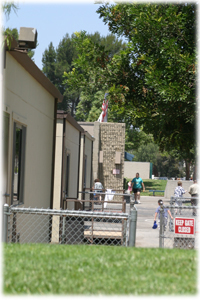Improving Public Schools
Students, teachers, and parents are used to portable classrooms. Of course, they were originally designed as a temporary solution to student population volatility in school districts. But, now we don't notice their deleterious effects on education.
Imagine for a moment housing for new teachers that might be built right on elementary and high school campuses in your area. Classroom sized, permanent structures would make ideal sized studio apartments for young teachers. And, if the design were done creatively, then these studio apartments might be easily converted into classrooms when student populations inevitably rise, and back to apartments again when they inevitably fall.
As the home construction industry in this country falters, public building projects like this make great sense. Below we present the longer argument against portables and also report the various affordable housing programs for teachers from around the country.
Let's make this a national campaign by working together as partners. Contact us and tell us your ideas about replacing portable classrooms with affordable housing for teachers on campuses in your area.
One of the best books written in the last decade is Malcolm Gladwell’s The Tipping Point: How Little Things Can Make a Big Difference, a national best seller. He tells the story of the “Broken Window Theory” on page 141:
“Broken Windows Theory was the brainchild of the criminologists James Q. Wilson and George Killing. Wilson and Killing argue that crime is the inevitable result of disorder. If a window is broken and left unrepaired, people walking by will conclude that no one cares and no one is in charge. Soon, more windows will be broken, and the sense of anarchy will spread from the building to the street on which it faces, sending a signal that anything goes. In a city, relatively minor problems like graffiti, public disorder, and aggressive panhandling, they write, are all the equivalent of broken windows, invitations to more serious crimes.”
The authors go on to report that former Mayor Rudy Guliani and Police Chief William Bratton reduced crime in New York City during the late 1990s by first cleaning up the little things, by applying the “Broken Windows Theory” to the streets of New York.
Applying these ideas to our public schools suggests that a deteriorating physical plant will cause disorder – including the weapons, drugs, bullying and so on so prevalent and so disruptive in inner-city schools today. Does this apply to public schools in high income districts as well? You bet it does.

Do your children attend class in a portable? Even with a new coat of paint and when generally well kept up, portables still visually and virtually “scream” at your kids that schools are not very important places. Why should a kid have respect for a teacher working in a cheap, temporary classroom?
Our schools should be the nicest and safest places in our neighborhoods. Indeed, schools are the heart of our neighborhoods. They should look like it. The “broken windows” must be fixed.
"Rows of portables, even well kept ones at these excellent Irvine, CA schools, speak loudly to our kids about the value the community places on education. "
Links to stories about affordable housing projects of teachers:
(Help us expand this list. )
Greensburgh, NY:
greenburghny.com
Santa Clara, CA:
abclocal.go.com
New York, NY:
usatoday.com
Agoura Hills, CA:
agourahills.patch.com
Orlando, FL:
blogs.orlandosentinel.com